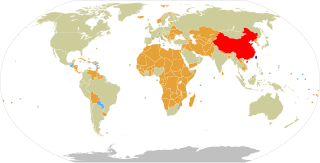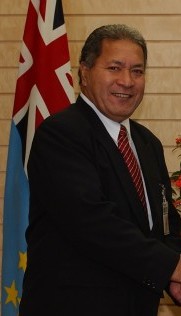
Foreign relations of the Republic of China (ROC), more commonly known as Taiwan, are accomplished by efforts of the Ministry of Foreign Affairs of the Republic of China, a cabinet-level ministry of the Government of the Republic of China. As of January 2024, the ROC has formal diplomatic relations with 11 of the 193 United Nations member states and with the Holy See, which governs the Vatican City State. In addition to these relations, the ROC also maintains unofficial relations with 59 UN member states, one self-declared state (Somaliland), three territories (Guam, Hong Kong, and Macau), and the European Union via its representative offices and consulates. In 2021, the Government of the Republic of China had the 33rd largest diplomatic network in the world with 110 offices.

Tuvalu is an island country in the Polynesian subregion of Oceania in the Pacific Ocean, about midway between Hawaii and Australia. It lies east-northeast of the Santa Cruz Islands, northeast of Vanuatu, southeast of Nauru, south of Kiribati, west of Tokelau, northwest of Samoa and Wallis and Futuna, and north of Fiji.

The member states of the United Nations comprise 193 sovereign states. The United Nations (UN) is the world's largest intergovernmental organization. All members have equal representation in the UN General Assembly.

The first inhabitants of Tuvalu were Polynesians, so the origins of the people of Tuvalu can be traced to the spread of humans out of Southeast Asia, from Taiwan, via Melanesia and across the Pacific islands of Polynesia.
The politics of Tuvalu takes place in a framework of a parliamentary representative democratic monarchy, whereby the monarch is the head of state, represented by the governor-general, while the prime minister is the head of government. Executive power is exercised by the government.

Vaitupu is the largest atoll of the nation of Tuvalu. It is located at 7.48 degrees south and 178.83 degrees east. There are 1,061 people living on 5.6 square kilometres with the main village being Asau.

The Gilbert and Ellice Islands in the Pacific Ocean was part of the British Empire from 1892 to 1976. It was a protectorate from 1892 to 12 January 1916, and then a colony until 1 January 1976, and was administered as part of the British Western Pacific Territories (BWPT) until it became independent as two separate states. The history of GEIC was mainly characterized by phosphate mining on Ocean Island. In October 1975, these islands were divided by force of law into two separate colonies, and they became independent nations shortly thereafter: the Ellice Islands became Tuvalu in 1978, and the Gilbert Islands with Banaba became part of Kiribati in 1979.

Saufatu Sopoanga was a Tuvaluan politician who served as the eighth prime minister of Tuvalu from 2 August 2002 to 27 August 2004. He drew international attention for his speeches warning about the effects of the rising sea level on Tuvalu and other low-lying island countries.
From 1916 to 1975, Tuvalu was part of the Gilbert and Ellice Islands colony of the United Kingdom. A referendum was held in 1974 to determine whether the Gilbert Islands and Ellice Islands should each have their own administration. As a consequence of the referendum, the separate British colonies of Kiribati and Tuvalu were formed. Tuvalu became fully independent as a sovereign state within the Commonwealth on 1 October 1978. On 5 September 2000, Tuvalu became the 189th member of the United Nations.

The G4 nations, comprising Brazil, Germany, India, and Japan, are four countries which support each other's bids for permanent seats on the United Nations Security Council. Unlike the G7, where the common denominator is the economy and long-term political motives, the G4's primary aim is the permanent member seats on the Security Council. Each of these four countries have figured among the elected non-permanent members of the council since the UN's establishment. Their economic, political and military influence has grown significantly in the last decades, reaching a scope comparable to the permanent members (P5). However, the G4's bids are often opposed by the Uniting for Consensus movement, and particularly their economic competitors or political rivals.

The United Nations Security Council veto power is the power of the five permanent members of the UN Security Council to veto any decision other than a "procedural" decision.

Since its creation in 1945, the United Nations Security Council has undergone one reform, increasing its membership from 4 to 10 non-permanent members. Nonetheless, this first and only reform has not left the global community satisfied, which has since then relentlessly called for a more all-encompassing reform. Reform of the Security Council encompasses five key issues: categories of membership, the question of the veto held by the five permanent members, regional representation, the size of an enlarged Council and its working methods, and the Security Council-General Assembly relationship. Despite a common agreement amongst member states, regional groups and academics on the need for reform, its feasibility is compromised by the difficulty to find an approach that would please all parties. Any reform of the Security Council would require the agreement of at least two-thirds of United Nations member states in a vote in the General Assembly and must be ratified by two-thirds of Member States. All of the permanent members (P5) of the UNSC, which hold veto rights, must also agree.

The Parliament of Tuvalu is the unicameral national legislature of Tuvalu. The place at which the parliament sits is called the Vaiaku maneapa. The maneapa on each island is an open meeting place where the chiefs and elders deliberate and make decisions.
The Christian Church of Tuvalu, is a Christian church and is the largest religious denomination in the country. This status entitles it to "the privilege of performing special services on major national events"; its adherents comprise about 86% of the 11,600 inhabitants of the archipelago.

The following outline is provided as an overview of and topical guide to Tuvalu:

The monarchy of Tuvalu is a system of government in which a hereditary monarch is the sovereign and head of state of Tuvalu. The current Tuvaluan monarch and head of state since 8 September 2022 is King Charles III. As sovereign, he is the personal embodiment of the Tuvaluan Crown. Although the person of the sovereign is equally shared with 14 other independent countries within the Commonwealth of Nations, each country's monarchy is separate and legally distinct. As a result, the current monarch is officially titled King of Tuvalu and, in this capacity, he and other members of the royal family undertake public and private functions domestically and abroad as representatives of the Tuvaluan state. However, the King is the only member of the royal family with any constitutional role.
Tuvalu became the 189th member of the United Nations in September 2000. Tuvalu is one of 14 states not recognising the People's Republic of China. The country has played a role in advocating for more ambitious international cooperation on mitigating climate change, given the country's vulnerability to its impacts.

United Nations Security Council Resolution 426, adopted on 19 March 1978 at the 2075th meeting of the Security Council, is concerned with both the creation of the United Nations Interim Force in Lebanon (UNIFIL) and the duration of its mandate. It comes immediately after and complements Resolution 425, adopted during an earlier meeting on the same day.

This is a survey of the postage stamps and postal history of Tuvalu.

Tuvaluan nationality law is regulated by the 1986 Constitution of Tuvalu, as amended; the 1979 Citizenship Ordinance, and its revisions; and various British Nationality laws. These laws determine who is, or is eligible to be, a national of Tuvalu. Tuvaluan nationality is typically obtained either on the principle of jus soli, i.e. by birth in Tuvalu or under the rules of jus sanguinis, i.e. by birth abroad to parents with Tuvaluan nationality. It can be granted to persons with an affiliation to the country, or to a permanent resident who has lived in the country for a given period of time through naturalisation. Nationality establishes one's international identity as a member of a sovereign nation. Though it is not synonymous with citizenship, for rights granted under domestic law for domestic purposes, the United Kingdom, and thus the Commonwealth, have traditionally used the words interchangeably.












